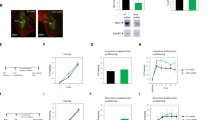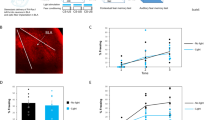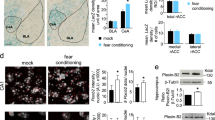Abstract
A-kinase anchoring proteins (AKAPs) constitute a family of scaffolding proteins that bind the regulatory subunits of protein kinase A (PKA). AKAP binding to PKA regulates the phosphorylation of various proteins, some of which have been implicated in synaptic plasticity and memory consolidation1,2,3,4. Here we show that the regulatory subunits of PKA are colocalized with AKAP150 (an AKAP isoform that is expressed in the brain)5 in the lateral amygdala (LA) and that infusion to the LA of the peptide St-Ht31, which blocks PKA anchoring onto AKAPs, impairs memory consolidation of auditory fear conditioning.
This is a preview of subscription content, access via your institution
Access options
Subscribe to this journal
Receive 12 print issues and online access
$209.00 per year
only $17.42 per issue
Buy this article
- Purchase on Springer Link
- Instant access to full article PDF
Prices may be subject to local taxes which are calculated during checkout


Similar content being viewed by others
References
Westphal, R.S. et al. Regulation of NMDA receptors by an associated phosphatase-kinase signaling complex. Science 285, 93–96 (1999).
Rosenmund, C. et al. Anchoring of protein kinase A is required for modulation of AMPA/kainate receptors on hippocampal neurons. Nature 368, 853–856 (1994).
Colledge, M. et al. Targeting of PKA to glutamate receptors through a MAGUK-AKAP complex. Neuron 27, 107–119 (2000).
Feliciello, A., Li, Y., Avvedimento, E.V., Gottesman, M.E. & Rubin, C.S. A-kinase anchor protein 75 increases the rate and magnitude of cAMP signaling to the nucleus. Curr. Biol. 7, 1011–1014 (1997).
Dodge, K. & Scott, J.D. AKAP79 and the evolution of the AKAP model. FEBS Lett. 476, 58–61 (2000).
Maren, S. Neurobiology of Pavlovian fear conditioning. Annu. Rev. Neurosci. 24, 897–931 (2001).
Schafe, G.E., Nader, K., Blair, H.T. & LeDoux, J.E. Memory consolidation of Pavlovian fear conditioning: a cellular and molecular perspective. Trends Neurosci. 24, 540–546 (2001).
Schafe, G.E. & LeDoux, J.E. Memory consolidation of auditory pavlovian fear conditioning requires protein synthesis and protein kinase A in the amygdala. J. Neurosci. 20, RC96 (2000).
Herberg, F.W., Maleszka, A., Eide, T., Vossebein, L. & Tasken, K. Analysis of A-kinase anchoring protein (AKAP) interaction with protein kinase A (PKA) regulatory subunits: PKA isoform specificity in AKAP binding. J. Mol. Biol. 298, 329–339 (2000).
Glantz, S.B., Amat, J.A. & Rubin, C.S. cAMP signaling in neurons: patterns of neuronal expression and intracellular localization for a novel protein, AKAP 150, that anchors the regulatory subunit of cAMP-dependent protein kinase II beta. Mol. Biol. Cell 3, 1215–1228 (1992).
Feliciello, A., Gottesman, M.E. & Avvedimento, E.V. The biological functions of A-kinase anchor proteins. J. Mol. Biol. 308, 99–114 (2001).
Fraser, I.D. et al. Assembly of an A kinase-anchoring protein-beta(2)-adrenergic receptor complex facilitates receptor phosphorylation and signaling. Curr. Biol. 10, 409–412 (2000).
Vijayaraghavan, S., Goueli, S.A., Davey, M.P. & Carr, D.W. Protein kinase A-anchoring inhibitor peptides arrest mammalian sperm motility. J. Biol. Chem. 272, 4747–4752 (1997).
Dodge, K.L., Carr, D.W., Yue, C. & Sanborn, B.M. A role for AKAP (A kinase anchoring protein) scaffolding in the loss of a cyclic adenosine 3',5′-monophosphate inhibitory response in late pregnant rat myometrium. Mol. Endocrinol. 13, 1977–1987 (1999).
Colledge, M. & Scott, J.D. AKAPs: from structure to function. Trends Cell Biol. 9, 216–221 (1999).
Acknowledgements
We thank G. Schafe and T. Blair for comments and C. Farb for technical support. M.A.P.M. was supported by the Gulbenkian Foundation and Program PRAXIS XXI/FCT under the Programa Gulbenkian de Doutoramento em Biologia e Medicina. R.L. was supported by a post-doctoral fellowship from the Human Frontier Science Program. National Institute for Mental Health grants MH38774, MH46516 and MH00956 to J.E.L.
Author information
Authors and Affiliations
Corresponding author
Ethics declarations
Competing interests
The authors declare no competing financial interests.
Supplementary information
Rights and permissions
About this article
Cite this article
Moita, M., Lamprecht, R., Nader, K. et al. A-kinase anchoring proteins in amygdala are involved in auditory fear memory. Nat Neurosci 5, 837–838 (2002). https://doi.org/10.1038/nn901
Received:
Accepted:
Published:
Issue Date:
DOI: https://doi.org/10.1038/nn901
This article is cited by
-
Protective effects of curcumin on desipramine-induced islet β-cell damage via AKAP150/PKA/PP2B complex
Acta Pharmacologica Sinica (2024)
-
A-Kinase Anchoring Protein 150 (AKAP150) Promotes Cocaine Reinstatement by Increasing AMPA Receptor Transmission in the Accumbens Shell
Neuropsychopharmacology (2018)
-
Long-term parental methamphetamine exposure of mice influences behavior and hippocampal DNA methylation of the offspring
Molecular Psychiatry (2015)
-
Delayed Noradrenergic Activation in the Dorsal Hippocampus Promotes the Long-Term Persistence of Extinguished Fear
Neuropsychopharmacology (2014)
-
Augmentation of Fear Extinction by D-Cycloserine is Blocked by Proteasome Inhibitors
Neuropsychopharmacology (2008)



